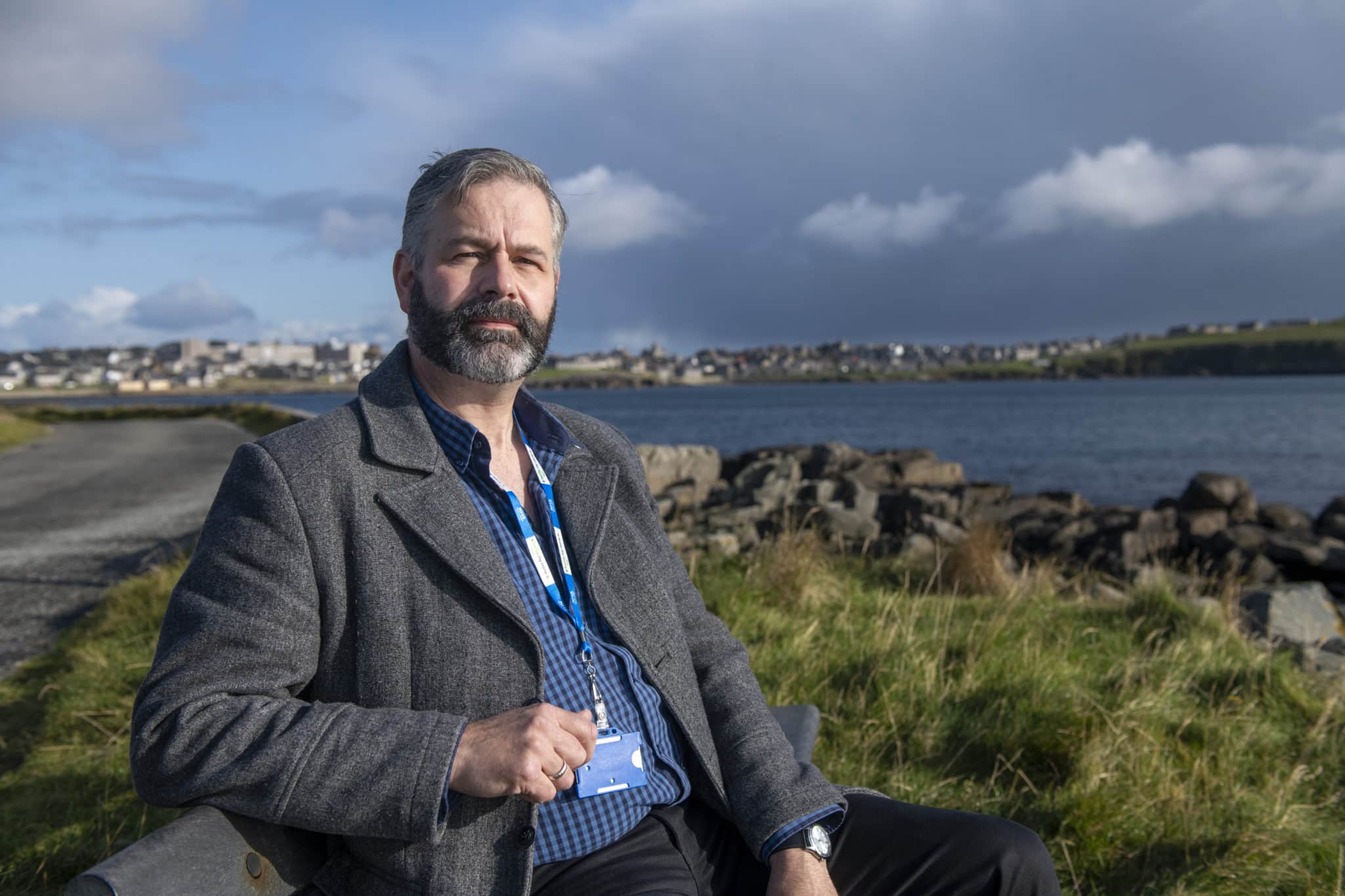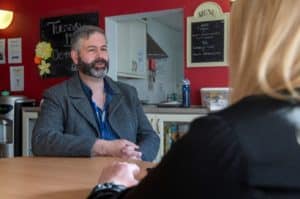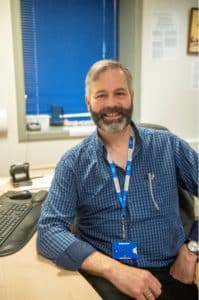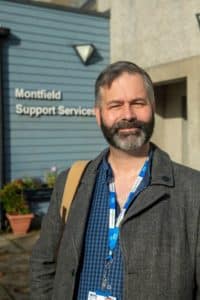Steve Mullay
Dementia Clinical Nurse Specialist
Shetland

I came into my present role around eight years ago when I joined an innovative nurse-led service to assess, diagnose and treat people with dementia. The service, which is part-funded by Alzheimer Scotland, arose from a redesign led by NHS Shetland and Shetland Islands Council. I work across the isles and can see people in care homes or at home. The main part of my role involves travelling across the archipelago (using a ‘rapid response’ approach when necessary) and working closely with patients, carers, health and social care professionals in coordinating multi-agency person-centred approaches to the management of significant stress and distress and associated risk.
 I came to nursing a bit later in life after a very varied start from sweeping streets, to labouring, to driving trucks. I moved to Australia in the 1990s and worked on building sites before deciding to go to university there to study nursing. I returned to Shetland reasonably soon after I qualified, and my first job was in a rehabilitation unit as a staff nurse. I went into older people’s medicine in hospital which I really enjoyed and stayed there for some time. I then took on a service redesign role, to clinically project manage integrated local services around dementia which led to me securing an opportunity to complete a PhD. I got my current job directly on the back of that research which looked at selfhood, how it was constituted and how that could be maintained for people with encroaching dementia. Doing my research, I became aware that people were very much shaped by the communities they grew up in and that they were supported in – especially here in Shetland. People grow up on a small island and if they have never lived anywhere else, they are the island and the island is them. It is key to deliver the nurse-led dementia service in the community – in a familiar, meaningful environment.
I came to nursing a bit later in life after a very varied start from sweeping streets, to labouring, to driving trucks. I moved to Australia in the 1990s and worked on building sites before deciding to go to university there to study nursing. I returned to Shetland reasonably soon after I qualified, and my first job was in a rehabilitation unit as a staff nurse. I went into older people’s medicine in hospital which I really enjoyed and stayed there for some time. I then took on a service redesign role, to clinically project manage integrated local services around dementia which led to me securing an opportunity to complete a PhD. I got my current job directly on the back of that research which looked at selfhood, how it was constituted and how that could be maintained for people with encroaching dementia. Doing my research, I became aware that people were very much shaped by the communities they grew up in and that they were supported in – especially here in Shetland. People grow up on a small island and if they have never lived anywhere else, they are the island and the island is them. It is key to deliver the nurse-led dementia service in the community – in a familiar, meaningful environment.
 It’s an advanced skillset and I need a deep knowledge of dementia and other pathologies. Working as an autonomous practitioner, I am assessing people, prescribing and diagnosing. I need to be able to go into a situation and use my clinical assessment skills to discover what is causing stress or distress – is it physical, environmental or interpersonal or a progression of dementia? It requires a holistic grasp of the issues around dementia which gives me a lot of confidence in what I do. I speak to a range of people daily; therefore, good communication skills are vital – whether that’s in consulting with other clinicians such as via video link with the older adult consultant psychiatrist in Aberdeen or speaking to relatives. I remain accessible – patients, their families, and professionals can all contact me. In this sense, I see myself as a resource; available for guidance, expert advice, coordination and most importantly reassurance.
It’s an advanced skillset and I need a deep knowledge of dementia and other pathologies. Working as an autonomous practitioner, I am assessing people, prescribing and diagnosing. I need to be able to go into a situation and use my clinical assessment skills to discover what is causing stress or distress – is it physical, environmental or interpersonal or a progression of dementia? It requires a holistic grasp of the issues around dementia which gives me a lot of confidence in what I do. I speak to a range of people daily; therefore, good communication skills are vital – whether that’s in consulting with other clinicians such as via video link with the older adult consultant psychiatrist in Aberdeen or speaking to relatives. I remain accessible – patients, their families, and professionals can all contact me. In this sense, I see myself as a resource; available for guidance, expert advice, coordination and most importantly reassurance.
 The key thing for me is to keep people with dementia out of hospital, to keep them living their lives in a familiar setting. I am very passionate about the efficiency of our service. We provide management of stress and distress, we are able to intervene quite quickly and often get on top of the issues before they become unmanageable locally. Previously, people could have been transferred off island for managing symptoms. We keep people at home, we keep them in their formative community. They can be living on a remote island and even coming to Lerwick on the main island can be a massive source of disruption. It can mean two ferry trips for some, taking an entire day and bringing them to an unfamiliar environment. It makes a massive difference to their health and wellbeing to be able to be seen in their own community. I also hope I have played a part in successfully changing attitudes; that my presence and work in communities across the isles has shown that people with a diagnosis of dementia can be supported to continue to live in and form a valuable part of that community, to end-of-life in many cases.
The key thing for me is to keep people with dementia out of hospital, to keep them living their lives in a familiar setting. I am very passionate about the efficiency of our service. We provide management of stress and distress, we are able to intervene quite quickly and often get on top of the issues before they become unmanageable locally. Previously, people could have been transferred off island for managing symptoms. We keep people at home, we keep them in their formative community. They can be living on a remote island and even coming to Lerwick on the main island can be a massive source of disruption. It can mean two ferry trips for some, taking an entire day and bringing them to an unfamiliar environment. It makes a massive difference to their health and wellbeing to be able to be seen in their own community. I also hope I have played a part in successfully changing attitudes; that my presence and work in communities across the isles has shown that people with a diagnosis of dementia can be supported to continue to live in and form a valuable part of that community, to end-of-life in many cases.